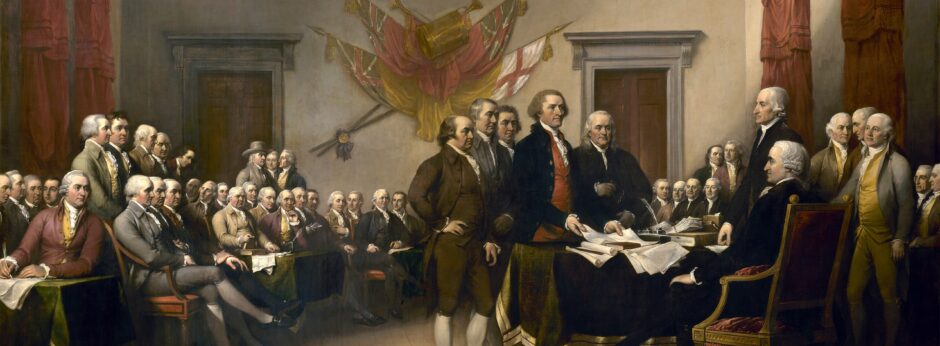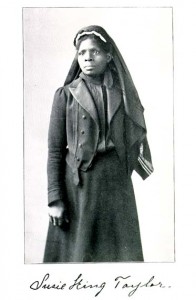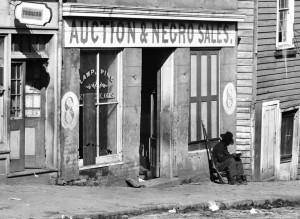In a time of chaos and confusion, it is hard to stay optimistic. However for Susie King Taylor optimism came naturally. Her determination in life inspired others, and allowed her to be an educated, independent, veteran in a time of oppression. Susie Taylor was born into slavery, but lived a life far less oppresses than the standard slave at the time. Susie’s mother worked as a domestic servant for the Gress Family on a farm in Liberty County Georgia, but Susie and her brother were treated almost as part of the master’s family. Susie recalled, “I had often been told by mother of the care Mrs. Grest took of me. She was very fond of me, and I remember when my brother and I were small children, and Mr. Grest would go away on business, Mrs. Grest would place us at the foot of her bed to sleep and keep her company.”[1]
At the age of seven Susie was allowed to go and live with her grandmother. While living with her grandmother in Savannah Georgia, Susie received an education in secret. At that time African Americans were not supposed to receive formal educations in the south. She was so determined to receive an education that she covertly went to school at odd hours of the day and had her books wrapped in paper so no one could see them. She would study as often as she could. Susie even asked close friends to tutor her at night. Although her home life was less oppressive than others, Susie still experienced oppression, and racism in the world around her. In her autobiography she said, “I have seen many times, when I was a mere girl, thirty or forty men, handcuffed, and as many women and children, come every first Tuesday of each month from Mr. Wiley’s trade office to the auction blocks, one of them being situated on Drayton Street and Court Lane, the other on Bryant Street, near the Pulaski House. The route was down our principal street, Bull Street, to the courthouse, which was only a block from where I resided.” [2]
When the Union Army invaded the South, Susie volunteered to assist the army in any way possible. She served as an aid in hospitals, a cook, a launderer, a tutor for the men in literacy and a friendly ear to talk to. She traveled with the army and as a result saw the devastating effects of war. She learned to fire a rifle and was fired at herself. While with the 1st S.C. Volunteers she experienced racism at every southern town she visited. Even when she helping to save the homes, and lives of Charlestonians in the aftermath of the attack on Charleston the inhabitants thanked her with sneers and insults. After the war she returned to Savannah Georgia where she opened a school for African American children.
Later in life she moved to Boston, where she worked as a maid. Her son became mortally sick and so she returned to the South to care for him. As she traveled through the south she was shocked at the rampant racism and treatment of blacks. Susie heard horror stories of murders and lynchings against blacks, and she herself faced blatant racism. Despite her obstacles she visited her son and buried him. One example that she recalled in her journey to the south was when she was in Cincinnati. She wrote, “I reached Cincinnati on the eighth, where I took the train for the south. I asked a white man standing near (before I got my train) what car I should take. “Take that one,” he said, pointing to one. “But that is a smoking car!” “Well,” he replied, “that is the car for colored people.” I went to this car, and on entering it all my courage failed me. I have ridden in many coaches, but I was never in such as these. I wanted to return home again, but when I thought of my sick boy I said, “Well, others ride in these cars and I must do likewise,” and tried to be resigned, for I wanted to reach my boy, as I did not know whether I should find him alive”[3] Despite all of the adversity Susie Taylor faced she carried on in a dignified manner and always lent a hand to those in need. She wrote her autobiography as a testament to the valor of the men who fought, and as a guide for understanding the life of an African American in the south.
[1] Taylor Susie King, “Reminiscences of My Life in Camp with the 33d United States Colored Troops Late 1st S. C. Volunteers: (Boston: By Author, 1902), 2.
[2] Taylor Susie King, “Reminiscences of My Life in Camp with the 33d United States Colored Troops Late 1st S. C. Volunteers: (Boston: By Author,1902), 65.
[3] Taylor Susie King, “Reminiscences of My Life in Camp with the 33d United States Colored Troops Late 1st S. C. Volunteers: (Boston: By Author, 1902), 69.



Received, thanks